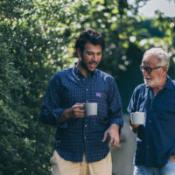 In a previous article, we looked at the role initiation ceremonies play in a culture, and how they help us detach from an outgrown identity and move into one more highly adapted to the present.
In a previous article, we looked at the role initiation ceremonies play in a culture, and how they help us detach from an outgrown identity and move into one more highly adapted to the present.
In traditional cultures, these ceremonies follow a strict protocol. First communion uses a basic format, and so do bat/bar mitzvahs. Even a bachelor stag party follows a certain sequence of ideas.
For most of us, the transition from midlife into old age isn’t provided with much structure. On the downside, this means it might not be observed or navigated. But on the upside, this leaves a lot of room for an individual experience of initiation. Psychotherapy is a practice in our culture that focuses on the individual. In what follows, we’re going to look at one man’s initiation from midlife to old age. (Names have been changed.)
Howard comes to therapy for relief from depression. He’s in his 70s, burly but fit and well-dressed. During the initial interview, he describes feelings of hopelessness, loss of pleasure, and irritability. His affect—the rise and fall of emotion as he speaks—is mild, but his mood (the “background” feeling) is irritable, not bitter so much as sour, with a sense of disappointment. I ask him if there have been any changes in his life recently. For instance, has he lost anyone? No, he says, not lately, though in the 1980s and ’90s his circle was hit pretty hard by HIV/AIDS. Then he laughs humorlessly and says, “I wouldn’t mind a change, though, to tell you the truth.”
He tells me he neither recognizes nor appreciates the old man he sees in the mirror. He describes his distaste at noticing age spots, at the continuing loss of skin tone. “I know I’m not a kid anymore,” he asserts, as if I’d accused him of this. “But I still feel like I’m in my 50s.” What are his 50s, I ask. “Like I should still be able to do things. Get up and get out. Meet someone new. But whenever I go out, it’s like I’m invisible.”
When Howard says he can’t believe he’s old, he seems to really internalize it. My impulse is to say, “You’re only as old as you feel,” but I don’t. Instead I sit with curiosity about why I would feel impelled to “rescue” him from old age. I ask him what “old” is. He tells me. It’s material I’ve heard before, and perhaps you have, too: old people can’t, old people don’t.
It’s a description of aging that’s prevalent in our culture, almost cartoon-like because it seems to flatten people out so they’re not quite real. Old age is adjacent to death, so it seems. And even though we don’t know what death is, our fear of it informs all of our other fears. No wonder so many of us avoid recognizing ourselves as old, and feel distress when we do. In a culture characterized by a fear of death, old age can be seen as a stigma—a sign that an individual has beliefs, qualities, or behaviors counter to the culture, and therefore threatening to it. Which might account for Howard’s experience of feeling invisible.
We begin by addressing some of the myths of aging. The first one we tackle is about declining sexuality in both men and women. In Geriatric Mental Health Care, Gary J. Kennedy, MD, notes that “the continuance of sexual activity into late age depends on the life pattern of each person.” Acceptance of a perceived inevitability of loss is linked to both loss of libido and even bodily changes. In How We Die, Anne Karpf cites a study on memory function in aging American and Chinese subjects. The study findings indicate that not only did the Chinese subjects do better on memory testing than their American counterparts, but they performed better than young Chinese adults. The researchers associate these findings to the fact ageism is less prevalent in China than in the United States. Howard and I discuss the idea of self-fulfilling prophecies.
Ageism is the idea that old age will be a mirror image of infancy. In the first stages of development, we acquire skills in sequence—language, mobility, continence, to name a few. Ageism suggests that all of us will, sometime before the end of life, lose those skills along with many others, and that anyone displaying signs of age is experiencing this loss of integrity. I find that Howard has a history of resisting prejudices, including internalized prejudices. I enlist this in our work together.
I ask him about meaningful experiences. This starts a life review—piecemeal at first, but gradually we get a chronology established. We don’t hear about the violent disagreements with his father when he was in his mid-teens, and that were the reason he left Illinois for the west coast, right away. Instead we start with his career as a counselor in a parole office that is both a source of pride and loss for him now in retirement. But eventually we come to his partnership with Don, which ended with Don’s death a decade ago, and to his marriage with Karen when they were both in their 20s, and their two children. Over many sessions, we put together a narrative that extends through seven decades, and that despite having some unsolved mysteries to it—what life doesn’t?—holds together so that meaning can be clearly observed.
One of the effects of such a review is that Howard becomes more grounded in his life—not just its events but its duration. There’s not so much of a disconnect between his actual age and his ownership of that age. He’s just a little bit less inclined to wish it away. For better and for worse, he’s related a history that requires 70-plus years for its unfolding.
As well, this life review places Howard’s own life into the context of his age cohort, and the events which shaped them and which they shaped in turn. Some of these he participated in literally, such as protests against the Vietnam war and his advocacy for ACT UP. His participation in others events is more symbolic but no less real, such as the moon landing and reunification of Germany. We find resources of accomplishment and pride here. In Identity and the Life Cycle, Erik Erikson describes the developmental tasks of later adult life as shifting allegiance from self and our small group to a larger field (“mankind, my kind”). As Howard considers the impact on history of his age cohort—whose accomplishments both include and extend beyond his personal ones—he has the opportunity to locate himself inside and identify with larger movements of life.
Old age is adjacent to death, so it seems. And even though we don’t know what death is, our fear of it informs all of our other fears. No wonder so many of us avoid recognizing ourselves as old, and feel distress when we do. In a culture characterized by a fear of death, old age can be seen as a stigma—a sign that an individual has beliefs, qualities, or behaviors counter to the culture, and therefore threatening to it.
During this stage, I encourage Howard to bring in photographs of meaningful others, and especially of his younger selves. As the conversation grows more intimate, we give names to the earlier versions of Howard. The slim, long-haired teenager is the Poet. The mustached thirty-something exploring a new sexual identity is Robert Redford. The bearded man demonstrating with his younger colleagues at an ACT UP protest is Papa. We marvel at the way one identity succeeded another, taking its turn to be lived. We open up and sit with the interesting problem that even though these identities are no longer the case, they will always be true. Howard is no longer the Poet, and yet Howard carries the Poet and all that identity’s youth and passion within him.
We also look at the fact Howard knows the answers to the questions that puzzled each of his “earlier selves.” He knows, for instance, how the struggle to come to terms with his own sexuality turned out—that struggle was difficult but ultimately rewarding—though the 29-year-old in the photo with Karen doesn’t. As he considers this odd fact, I take the opportunity to wonder out loud if there is an older Howard “up ahead” who knows how Howard resolves his conflicts about old age.
I introduce Howard to Carl Jung’s concept of Self. This is the organizing principle of the psyche, one that initially operates on an unconscious level but with which a conscious relationship can be formed. To illustrate this, I tell Howard a person can have a set of values he lives by without stopping to think about them, but if he becomes aware of what his values are he’s able to live them more effectively, relating to them as he would a blueprint or a compass.
The Self is often personified in fairy tales as the wise old man or woman—think Cinderella’s fairy godmother or Obi-Wan Kenobi of Star Wars. In a rational sense, this combination of wisdom and age speaks to our having lived the earlier stages of our lives and learned through them who we are and what the world is. In an intuitive sense, who I am now and how I’ve lived or not lived so far implies who I will be. That “future self” is implicit in who I am now.
Howard is intrigued by this image of an older self, or Self, from whose point of view his present issues are all resolved one way or another. “I don’t feel so lost,” he says. “In a funny kind of a way, it’s like I already know the answers. It’s just a matter of remembering them.” He’s also interested to think that compared to this image of the Self, he’s the younger of the two. That if the Self is the cumulative image of his full life span, Howard is not there yet.
We look at the fact that if Howard had refused to go on to have new and further experience when he was the Poet, then Robert Redford, Papa, and the others wouldn’t have had their times to be lived. He says about the Self, “I feel like he’s waiting his turn. Like he’s depending on me to live him. I don’t want to let him down.” I reflect the positive nature of such a relationship to the Self. Erikson describes “the acceptance of one’s own and only life cycle,” and Jung refers to participating in “the ego/Self axis.” Both ideas act as guideposts to the same fact, that it’s possible to experience old age with integrity and hope.
In The Measure of My Days, a book of reflections written when she was in her 80s, Florida Scott-Maxwell notes, “Personal immortality may not matter at all. Perhaps our long insistence on it has been our need of spiritual value, and a groping conviction that is our central truth; that we have a share in impersonal greatness.”
If he was the Poet when he was in his 20s and Papa in his 50s, I ask Howard who is he now. He thinks about it, then grins and says, “Well, I guess I’m the Traveler now.” On the spur of the moment he asks if I’ll take a picture of him using his Android phone. I do, and Howard has his first photograph of the Traveler, evidence that he passed this way.
References:
- Erikson, E. (1980). Identity and the Life Cycle. New York: Norton.
- Jung, C.G. (1966). The Practice of Psychotherapy: Essays on the Psychology of the Transference and other Subjects (Collected Works Vol. 16). Princeton, N.J.: Princeton University Press.
- Karpf, A. (2014). How to Age. London: Picador.
- Kennedy, G. J. (2000). Geriatric Mental Health Care. New York: Guilford Press.
- Scott-Maxwell, F. (1968). The Measure of My Days. New York: Penguin Books.

The preceding article was solely written by the author named above. Any views and opinions expressed are not necessarily shared by GoodTherapy.org. Questions or concerns about the preceding article can be directed to the author or posted as a comment below.

 How to Ease a Loved One's Transition into a Nursing Home
How to Ease a Loved One's Transition into a Nursing Home How to Help an Aging Parent with Depression
How to Help an Aging Parent with Depression At a Loss: The Day-to-Day Toll of Dealing with Dementia
At a Loss: The Day-to-Day Toll of Dealing with Dementia

